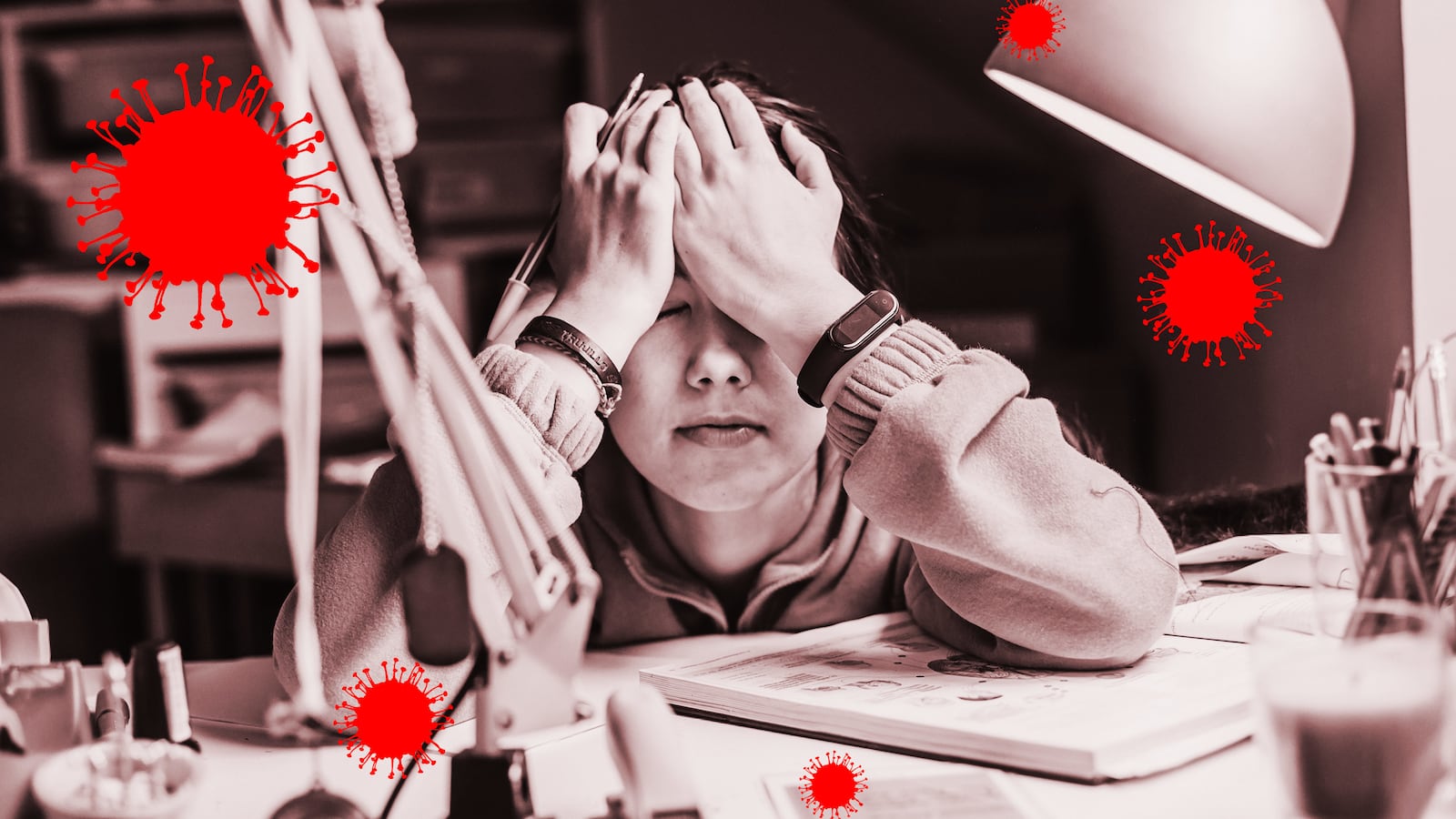In the best of times, the bar exam is stressful—a two-day marathon that determines whether law school graduates will be able to practice the career they spent three years and a mountain of cash pursuing. But this year, test-takers say, it was nothing short of inhumane.
Nearly a dozen graduates who spoke to The Daily Beast described the exam—which many places administered online this year, for the first time ever—as a disorganized, glitch-filled disaster. Test-takers were locked out of the exam for hours, refused accommodations for their disabilities, and even sat in their own urine and feces for fear of leaving the view of the web cameras.
One test-taker, who asked to remain anonymous for reasons that will quickly become apparent, said she spent the break between sessions mopping pee off her floor.
“I can’t believe there is video of me pissing myself on camera just so I have the right to take this stupid exam,” she said.
The problems with the bar started months before exam day. The tests are proctored by the local bar administration in each state twice a year—and this year, it seemed like every state had a different plan. In New York, the Board of Law Examiners initially pushed the bar to September, then three months later announced that it would actually be administered remotely in October.
The board also initially claimed it would prioritize spots for graduates of New York law schools—sending out-of-towners scrambling to find new locations—then reversed course and said it would have room to test out-of-state graduates after all.
“We were trying to stand on a balance ball, juggling all these things, while they shifted the ground underneath us,” said Rachel Farkas, a Georgetown Law School graduate.
“I can sit and study for eight hours a day, but if you keep changing where the exam is, and if the exam is, it’s incredibly exhausting,” she said. “It’s hard to set a schedule and feel stable when that’s happening.”
There were other, more serious consequences to the delay. Usually, candidates take the bar in July and start working as attorneys over the summer. But this year, many were unable to find jobs until they sat for the bar in October. Alexandra Garza, a graduate of Cardozo Law School, said she was offered a job in August, then had it rescinded in favor of an applicant who had already passed the bar. Her mother had to take on a second job to help keep her afloat while she studied.
“It was hard to get sympathy from people because when you think of a law student or a law graduate, you think of affluent people, but that's not the case for a lot of us,” Garza said.
The situation was even more stressful for international students. Some student visas allow a 60-day grace period for recipients to find an employer sponsor after graduation. Pim, a recent graduate who asked to be identified by first name only, said she intended to take the bar in July and find a sponsor well within the required time frame. But with the bar pushed back to October, she had to work a string of temporary jobs while her classmates studied full-time for the exam.
She said the entire experience had undermined her faith in the equity of U.S. institutions like the National Conference of Bar Examiners, which develops and produces the test and provides guidance to local administrators.
“If I move back to Thailand because things don't work out this year and I have a child, I will not send her back to the U.S.,” she said. “Because I know the U.S. institutions and government wouldn’t give a shit about her.”
Amid all this, students were also raising concerns about the software used to administer the test. The software, called Examplify, records test-takers remotely and uses artificial intelligence to flag any potential indications of cheating, such as moving too much or leaving the camera frame for too long. Disability rights advocates said this system would disadvantage students who need to move, fidget, or take medication during the exam. (Some even worried that taking insulin for their diabetes would result in a flag.) And students of color pointed out that such software often struggles to recognize non-white faces, putting some students at a disadvantage.
Tara Roslin, director of research at the National Disabled Law Students Association, said the bar associations in many jurisdictions were unsympathetic and uncommunicative about these concerns. In multiple states, people who required paper tests or frequent breaks were required to take the exam in person, risking COVID-19 exposure in order to secure their accommodations. A test-taker in Illinois was denied an accommodation for bathroom breaks despite being 38 weeks pregnant, and wound up giving birth in the middle of the exam. She had to finish the test from her hospital bed. (In an email to The Daily Beast, ExamSoft held this up as a success story, writing that this “would not have been possible without a remote Bar exam.”)
The NCBE deferred all questions about accommodations to individual jurisdictions.
By the time exam day rolled around, the law school grads were anxious and exhausted. But their problems had just started. Nick Kristensen, another Georgetown grad, told The Daily Beast he diligently installed his software and took two mock exams before test day to make sure it worked. But when he logged in on Oct. 5, he received an error message saying his computer was incompatible with the software. Kristensen called the software manufacturer, then the Illinois bar association, then the manufacturer again, but got nowhere. It wasn’t until his father suggested using his old, backup laptop that he was able to get the software to run—three hours after the test had started.
Colin Darnell, a graduate of Indiana University, said he actually withdrew from the exam after spending more than two hours on the phone with tech support. It wasn’t until his tweet about the experience went viral that the president of the New York Board of Law Examiners called him personally and worked out a solution.
“I think the BOLE will hold me up as some kind of success story. I want to be clear that I am not a success story,” he said. “We knew months in advance that this software was not going to be good, that there were going to be issues… We sounded the alarm and they didn’t care.”
In an email, an ExamSoft spokesperson said that support cases on test day were “primarily educational in nature, rather than technical,” and that nearly all of the technical support cases stemmed from user devices not meeting the published minimum system requirements.
Other test-takers were able to log in on time, but were left in humiliating situations by the strict instructions. Because leaving the camera frame for an extended amount of time could potentially be flagged as cheating, multiple at-home test-takers reported peeing or pooping their pants during the exam rather than getting up to use the restroom. (The situation in some in-person testing sites wasn’t much better: One Colorado test-taker told The Daily Beast that the bathroom allocated to her testing group cohort went out of order 30 minutes into the first day of testing and was never repaired.)
“We’re people who are good at following rules and following instructions—that’s literally our jobs,” Farkas said. “And even then it was like, ‘This is impossible.’”
“It felt like we were fighting people who didn’t give a shit what we were going through,” she added. “It was like hazing of the worst kind.”
ExamSoft said that all flagged exams are reviewed by human proctors and sent to the jurisdictions for final evaluation. The NCBE deferred all questions about technical issues to ExamSoft.
In an interview with Law.com, NCBE President Judith Gundersen said she considered the test a success because most candidates were able to safely and successfully take the bar. Based on reports from most jurisdictions, she said, the access and completion rate was higher than 98 percent. “By all accounts, people were able to access the material, complete the questions, and upload the files,” she said.
But the test-takers interviewed by The Daily Beast said that the focus should not be on the 98 percent of candidates who were able to take the test successfully, but the 2 percent who were not.
“Ultimately I think the system ended up working for me, but a system that doesn’t work for everyone isn’t worth keeping,” Darnell said.
“Ultimately the NCBE had a duty to provide safe and secure software and they were not able to do that, and they should be ashamed of that.”






